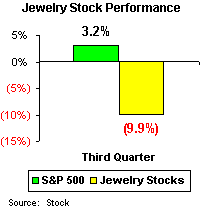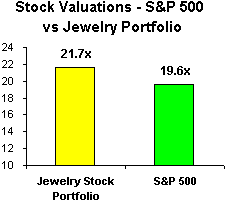IDEX Online Research: Jewelry Stock Portfolio Volatile in Third Quarter
November 03, 05
Jewelry Stock Universe Third Quarter 2005 Performance Company % Chg End Price LJ Int'l 42% $ 3.19 Tiffany 21% $ 39.77 Aber 19% $ 36.63 Chas & Colvard 2% $ 24.96 Movado (1%) $ 18.72 Blue Nile (3%) $ 31.64 Lazare Kaplan (3%) $ 9.86 Signet (7%) $ 18.28 Zale (14%) $ 27.18 Finlay (28%) $ 9.05 Odimo (71%) $ 1.48 Whitehall (75%) $ 1.69 Source: Wall Street Based on an equal-weighted index of twelve stocks, the IDEX Jewelry Stock Portfolio posted a decline of nearly 10% in the third quarter versus a 3% gain for the broad market S&P 500, as the graph illustrates. Losers outnumbered gainers by two-to-one. Until the third quarter of 2005, the IDEX Jewelry Stock Portfolio had been consistently outperforming the market. However, jewelry stocks significantly under-performed the broad market in the third quarter due to a variety of factors including valuation issues, worries about consumers’ discretionary spending, and potential economic woes. For most of the quarter, the stock market was strong. It began to slip in September as news about the impact of Hurricanes Katrina and Rita hit investors with full force. However, jewelry stocks began sliding early in the quarter, and their declines accelerated in September. Stock Performance May Be Related To Questions about Discretionary Spending

Why did jewelry stocks under-perform in the third quarter? Stock market action is often very difficult to explain. Logic does not prevail. After spending over twenty years on Wall Street, we are still often surprised by stock price action.
The prevailing excuse for the sharp decline of jewelry stocks in the third quarter relates to analysts’ perception that consumers won’t be spending on discretionary goods, both as a result of soaring gasoline prices and as a result of plummeting consumer confidence related to many factors including two devastating hurricanes, high energy prices, and a host of other shocks to the system.
On the other hand, smart investors know that luxury demand is rarely affected by external shocks to the system, GDP fluctuations, and other economic indicators such as employment.
Based on this “on one hand . . . and on the other hand” reasoning, perhaps most of the third quarter stock performance can be explained. For example, on one hand, the stock prices of Tiffany & Co. and Aber rose solidly in the quarter. Both are involved at the luxury (high-end) of the market. Aber not only sells better quality rough diamonds, but it also owns Harry Winston, a luxury jeweler. Tiffany & Co. operates high-end jewelry stores. On the other hand, the stock prices of most of the mass market jewelers declined. This suggests that Wall Street investors think that high gasoline prices will have a negative impact on spending by mid- and lower-income consumers.
Stock Valuations
Where are the jewelry stocks headed? Higher? Lower? While many factors have an influence on the price of equities, it is clear that jewelry stocks are generally at the high end of their historic valuation ranges. Just a couple of years ago, most jewelry stocks sold for a single digit price/earnings multiple – 7.0-9.9x current year earnings. 
Currently, the stocks in the IDEX Jewelry Stock Portfolio are selling for almost 22 times this year’s projected earnings. In contrast, the S&P 500 is selling for just under 20 times this year’s projected earnings. Investors may be selling jewelry stocks because of the current above-average valuation levels.
Click here to read the full story about publicly held jewelry industry stocks.
Disclaimer: The author owns 100 or less shares of every publicly held retailer in the portfolio as well as some others which are not listed. This allows the author to have access to information which some companies restrict to “shareholders only.”